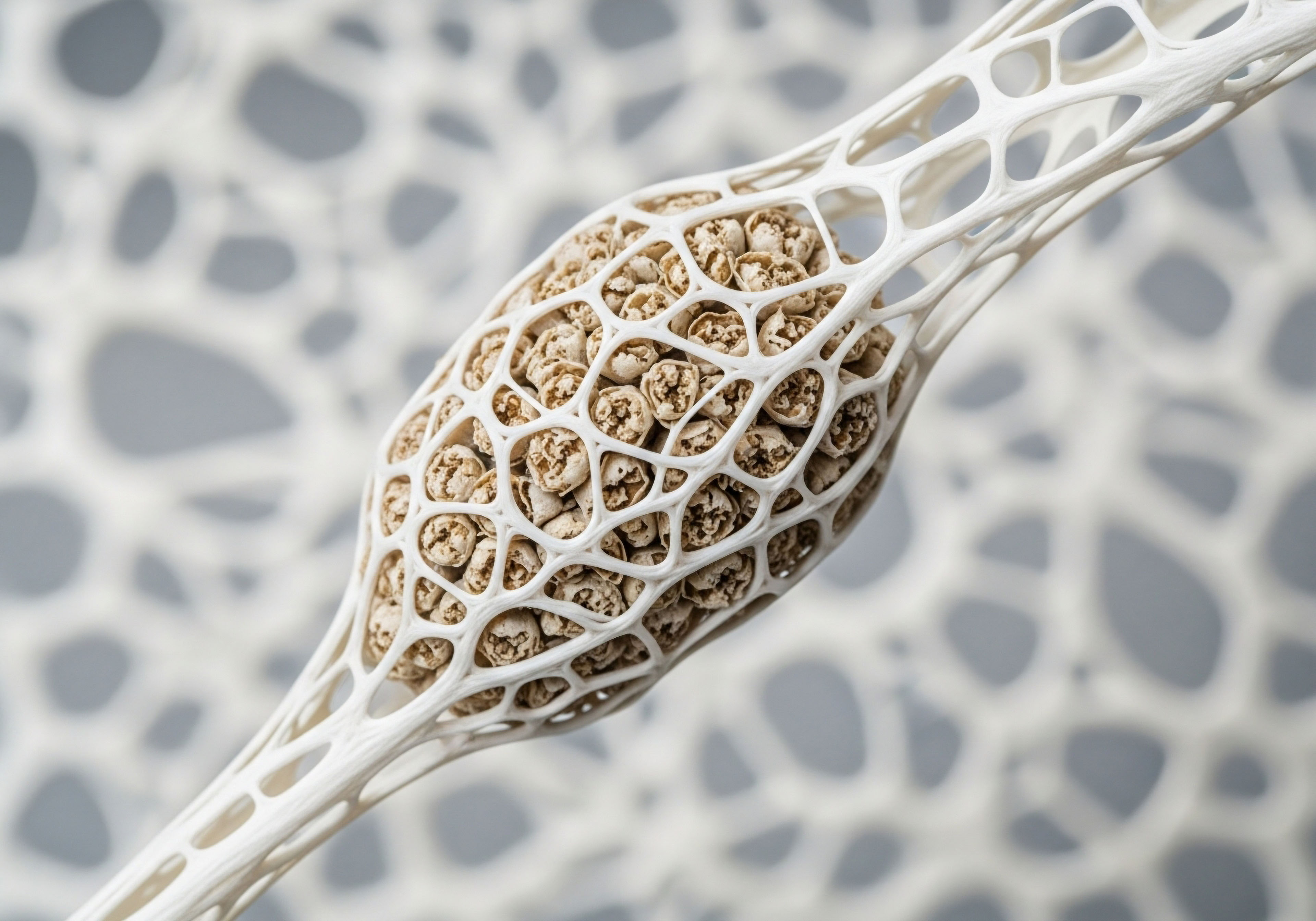

Fundamentals
You feel it in your bones, a subtle yet persistent hum of disharmony. It’s the fatigue that coffee can’t touch, the inches that cling to your waistline despite your best efforts, and the emotional static that clouds your days.
You’ve described these feelings, perhaps to a doctor, a friend, or even to yourself in the quiet moments of the morning, and the explanations you’ve received may have felt incomplete, leaving you with a sense of being unheard. Your experience is valid.
The story your body is telling is one of a communication breakdown, a story that begins deep within your cells. This is where we begin our exploration, not with a dismissal of your symptoms, but with a validation of their biological origin. We will journey into the world of cellular receptors, the gatekeepers of your body’s intricate messaging system, and discover how your daily choices hold the power to restore the clarity of their communication.

The Body’s Internal Mail System
Imagine your body as a vast and bustling city. Hormones are the mail carriers, zipping through your bloodstream to deliver critical messages. These messages instruct your cells on everything from how to use energy to how to grow and repair. For a message to be received, it must be delivered to the correct address.
In your body, these addresses are cellular receptors. Each receptor is a specialized protein structure on the surface of or inside a cell, designed to recognize and bind to a specific hormone, much like a key fits a lock. When a hormone binds to its receptor, it unlocks a specific action within the cell. This elegant system ensures that your body functions in a coordinated and balanced way.

When the Mail Goes Unanswered
Now, imagine the mail carriers are working overtime, delivering a constant flood of messages. The mailboxes at each address become overwhelmed. Some might even shut down to avoid the deluge. This is what happens when your cells are overexposed to a particular hormone. They can become less responsive, a state known as receptor insensitivity or resistance.
The messages are being sent, but they are not being heard. This is the root of many of the symptoms you may be experiencing. For instance, with insulin resistance, your cells become deaf to the call of insulin, the hormone that tells them to take up sugar from your blood for energy.
The result is high blood sugar and a cascade of metabolic problems. Similarly, when your cells become resistant to thyroid hormones, your metabolism can slow to a crawl, leading to weight gain and fatigue, even when your lab tests show “normal” hormone levels.
Your body’s vitality depends on the clarity of communication between your hormones and their cellular receptors.

The Power of Lifestyle to Re-Tune the System
The encouraging truth is that you are not a passive observer in this process. Your lifestyle choices are the most powerful tools you have to influence the sensitivity of your cellular receptors.
The food you eat, the way you move your body, the quality of your sleep, and how you manage stress all send powerful signals to your cells, instructing them to either open their doors to hormonal messages or to shut them tight.
For example, a diet rich in whole foods, like the Mediterranean diet, has been shown to improve insulin sensitivity, helping your cells to once again hear the message of insulin clearly. Regular physical activity does more than just burn calories; it can actually increase the number and sensitivity of receptors for hormones like testosterone, enhancing their effects on muscle growth and vitality.
This is the foundation of personalized wellness ∞ understanding the language of your cells and learning how to speak it through your daily actions.
This journey is about reclaiming your biological sovereignty. It is about moving beyond the frustration of unexplained symptoms and stepping into the power of understanding your own body. By learning how to influence your cellular receptors, you can begin to restore the harmony of your internal communication system and, in doing so, reclaim the vibrant health that is your birthright.


Intermediate
Having established that your cells possess a dynamic ability to listen to hormonal signals, we can now explore the specific mechanisms through which lifestyle interventions orchestrate this cellular symphony. The sensitivity of your receptors is not a fixed state. It is a constantly adapting process, a biological conversation between your genes and your environment.
Your daily choices are the words you use in this conversation, and they have the power to either amplify or mute the messages that govern your health. We will now examine the clinical science behind how diet, exercise, sleep, and stress management directly influence the behavior of your cellular receptors, providing you with a practical framework for recalibrating your endocrine system.

Upregulation and Downregulation the Cellular Volume Control
At the heart of receptor sensitivity lies the concepts of upregulation and downregulation. Think of these as the volume control for your cells’ hormonal reception. When your body wants to amplify a hormonal signal, it can increase the number of receptors on a cell’s surface, a process called upregulation.
This makes the cell more sensitive to the hormone, allowing it to respond to even small amounts. Conversely, when a cell is bombarded with too much of a hormone, it can protect itself by reducing the number of available receptors, a process known as downregulation.
This desensitizes the cell, making it less responsive to the hormonal signal. Many chronic health conditions, including type 2 diabetes and some forms of hormonal imbalance, are characterized by receptor downregulation in response to chronically elevated hormone levels.

Dietary Strategies for Enhancing Receptor Sensitivity
The food you consume provides the building blocks for your hormones and directly influences the environment in which your receptors operate. A diet high in processed foods and refined sugars can lead to chronically high insulin levels, forcing your cells to downregulate their insulin receptors and paving the way for insulin resistance. Conversely, specific dietary strategies can promote receptor upregulation and restore metabolic flexibility.
| Dietary Approach | Mechanism of Action | Key Foods |
|---|---|---|
| Mediterranean Diet | Rich in monounsaturated fats and polyphenols, which reduce inflammation and oxidative stress, protecting receptor function. | Olive oil, nuts, seeds, fatty fish, vegetables, fruits. |
| Low-Glycemic Diet | Minimizes blood sugar spikes, reducing the burden on insulin-producing cells and preventing insulin receptor downregulation. | Non-starchy vegetables, legumes, whole grains, lean proteins. |
| Intermittent Fasting (e.g. 5:2 diet) | Periods of caloric restriction can improve cellular repair processes (autophagy) and increase insulin sensitivity. | Focuses on timing of meals rather than specific foods, but whole foods are recommended. |
| Plant-Based Diets | High in fiber, which slows glucose absorption and improves gut health, both of which are linked to better insulin sensitivity. | Fruits, vegetables, legumes, whole grains, nuts, seeds. |
These dietary patterns share a common thread ∞ they are rich in nutrients that combat inflammation and oxidative stress, two key drivers of receptor damage and dysfunction. By nourishing your body with these foods, you create an internal environment that is conducive to clear and efficient hormonal communication.
Strategic dietary choices can directly combat the cellular inflammation that dulls receptor sensitivity.

Exercise the Great Receptor Sensitizer
Physical activity is a potent modulator of receptor sensitivity, with effects that extend far beyond weight management. Exercise acts as a powerful signal to your cells, telling them to become more efficient at utilizing fuel and responding to hormonal cues. This is particularly evident in its effects on insulin and androgen receptors.
- Insulin Receptors ∞ During exercise, your muscles can take up glucose from the bloodstream with less reliance on insulin. This gives your pancreas a rest and reduces the chronic exposure of your cells to high insulin levels. Over time, regular exercise can lead to a significant improvement in insulin sensitivity, as your cells upregulate their insulin receptors to become more responsive to the hormone.
- Androgen Receptors ∞ Resistance training, in particular, has been shown to increase the density and sensitivity of androgen receptors in muscle tissue. This means that the testosterone circulating in your body can bind more effectively to your muscle cells, promoting growth and repair. This is a key reason why exercise is so crucial for maintaining muscle mass and strength as we age. It’s not just about boosting testosterone levels; it’s about ensuring that your body can effectively use the testosterone it has.

The Role of Sleep and Stress in Receptor Function
Your sleep-wake cycle and your response to stress are intimately connected to your hormonal health. Chronic sleep deprivation and unmanaged stress can wreak havoc on your receptor sensitivity, creating a state of hormonal chaos.
Sleep and Melatonin Receptors ∞ Sleep is a critical period for hormonal regulation and cellular repair. The hormone melatonin, produced in darkness, plays a key role in this process by binding to its receptors in the brain and other tissues.
Disrupted sleep patterns can interfere with melatonin production and desensitize its receptors, leading to a cascade of negative effects on other hormonal systems, including those that regulate appetite and stress. Prioritizing consistent, high-quality sleep is a non-negotiable aspect of maintaining hormonal balance.
Stress and Glucocorticoid Receptors ∞ When you experience stress, your adrenal glands release cortisol. In the short term, this is a healthy and adaptive response. However, chronic stress leads to chronically elevated cortisol levels. This constant bombardment of cortisol can cause your glucocorticoid receptors to become resistant.
When your glucocorticoid receptors become resistant, your body loses its ability to effectively regulate the stress response and inflammation. This can lead to a state of chronic inflammation, fatigue, and a host of other health problems. Practices such as mindfulness, meditation, and deep breathing can help to regulate your stress response and restore the sensitivity of your glucocorticoid receptors.
By understanding these intermediate mechanisms, you can begin to see how your daily habits are not just about feeling good in the moment, but about fundamentally reshaping the way your body communicates with itself. You have the power to turn up the volume on the hormonal messages that promote health and vitality, and to turn down the volume on those that contribute to dysfunction and disease.


Academic
Our exploration now transitions to a deeper, more granular level of analysis, examining the molecular and cellular mechanisms that underpin the influence of lifestyle interventions on receptor sensitivity. From a systems-biology perspective, the endocrine system is a complex, interconnected network, and the sensitivity of its receptors is governed by a delicate interplay of genetic predispositions, epigenetic modifications, and environmental inputs.
We will now focus on the intricate signaling pathways and molecular events that translate lifestyle choices into tangible changes in cellular function, with a particular emphasis on the convergence of metabolic and hormonal signaling.

The Molecular Crossroads of Receptor Sensitivity
At the molecular level, receptor sensitivity is not a simple matter of receptor number. It is a dynamic process involving a complex web of intracellular signaling pathways, post-translational modifications, and gene expression regulation. Two of the most critical pathways in this regard are the AMP-activated protein kinase (AMPK) pathway and the mammalian target of rapamycin (mTOR) pathway. These pathways act as cellular energy sensors, and their activity is profoundly influenced by lifestyle factors such as diet and exercise.
AMPK is often referred to as the body’s “metabolic master switch.” It is activated in times of energy deficit, such as during exercise or caloric restriction. Once activated, AMPK sets in motion a cascade of events designed to restore energy balance, including the uptake of glucose into cells and the burning of fat for fuel.
Crucially, AMPK activation has been shown to enhance insulin sensitivity by promoting the translocation of GLUT4 glucose transporters to the cell membrane, a process that is independent of insulin signaling. This provides a molecular explanation for how exercise can improve glycemic control even in the presence of insulin resistance.
In contrast, the mTOR pathway is activated in times of energy surplus and is a key regulator of cell growth and proliferation. While essential for processes like muscle protein synthesis, chronic overactivation of the mTOR pathway, often driven by a diet high in processed foods and excess calories, has been linked to the development of insulin resistance.
Overactive mTOR can interfere with insulin signaling by phosphorylating and inhibiting insulin receptor substrate 1 (IRS-1), a key molecule in the insulin signaling cascade. This creates a state of cellular “crosstalk” where the signals of nutrient abundance drown out the signals of insulin.
The interplay between the AMPK and mTOR pathways represents a critical control point where lifestyle interventions can directly influence the molecular machinery of receptor sensitivity.

The Inflammatory Basis of Receptor Dysfunction
A growing body of research points to chronic, low-grade inflammation as a central driver of receptor insensitivity across multiple hormonal systems. This “meta-inflammation,” as it is sometimes called, is often a consequence of lifestyle factors such as a poor diet, lack of exercise, chronic stress, and poor sleep. Inflammatory molecules called cytokines, such as tumor necrosis factor-alpha (TNF-α) and interleukin-6 (IL-6), can directly interfere with receptor signaling.
In the context of insulin resistance, inflammatory cytokines can activate stress-activated kinases, such as c-Jun N-terminal kinase (JNK), which in turn can phosphorylate IRS-1 and disrupt insulin signaling. This creates a vicious cycle where insulin resistance promotes inflammation, and inflammation worsens insulin resistance.
Similarly, in the case of glucocorticoid resistance, chronic stress can lead to an overproduction of inflammatory cytokines, which can then impair the function of the glucocorticoid receptor, reducing its ability to suppress inflammation. This highlights the importance of lifestyle interventions that target inflammation, such as a diet rich in anti-inflammatory foods and regular exercise, as a primary strategy for preserving receptor sensitivity.

Epigenetic Modifications a Bridge between Lifestyle and Genes
While your genetic makeup plays a role in your predisposition to certain hormonal imbalances, it is not your destiny. The field of epigenetics has revealed that lifestyle factors can induce chemical modifications to your DNA and its associated proteins, which can alter gene expression without changing the DNA sequence itself. These epigenetic modifications, such as DNA methylation and histone acetylation, can have a profound impact on the expression of genes that code for hormonal receptors and signaling molecules.
For example, studies have shown that exercise can induce epigenetic changes that lead to an increase in the expression of genes involved in glucose metabolism and insulin sensitivity. Conversely, a high-fat diet has been shown to induce epigenetic modifications that contribute to the development of insulin resistance.
This means that your lifestyle choices are, in a very real sense, writing instructions on your DNA, telling your genes how to behave. This provides a powerful mechanism through which the effects of lifestyle interventions can be sustained over the long term.
| Intervention | Primary Molecular Target | Effect on Receptor Sensitivity | Key Mediators |
|---|---|---|---|
| Resistance Exercise | Androgen Receptor (AR) | Increases AR density and DNA binding | Mechanical loading, Wnt/β-catenin signaling |
| Caloric Restriction | Insulin Receptor (IR) | Improves insulin signaling | AMPK activation, reduced mTOR signaling |
| High-Fiber Diet | Insulin Receptor (IR) | Enhances insulin sensitivity | Production of short-chain fatty acids (SCFAs) by gut microbiota |
| Chronic Stress | Glucocorticoid Receptor (GR) | Induces GR resistance | Increased inflammatory cytokines (TNF-α, IL-6) |
The academic perspective reveals that the connection between lifestyle and cellular health is not a matter of conjecture, but a well-defined series of molecular events. By understanding these intricate mechanisms, we can appreciate the profound and precise control we have over our own biology. The choices we make each day are not trivial; they are potent biological signals that resonate through our cells, shaping our health from the inside out.

References
- Willoughby, D. S. & Taylor, L. (2004). Effects of sequential bouts of resistance exercise on androgen receptor expression. Medicine and Science in Sports and Exercise, 36(9), 1499-1506.
- Enea, C. et al. (2009). The effects of a 1-year dietary intervention on insulin resistance, the metabolic syndrome, and body weight in a cohort of Italian women. Nutrition, Metabolism and Cardiovascular Diseases, 19(10), 711-718.
- Cohen, S. et al. (2012). Chronic stress, glucocorticoid receptor resistance, inflammation, and disease risk. Proceedings of the National Academy of Sciences, 109(16), 5995-5999.
- Vgontzas, A. N. et al. (2001). Chronic insomnia and activity of the stress system ∞ a preliminary study. Journal of psychosomatic research, 51(4), 625-634.
- Hawley, J. A. & Lessard, S. J. (2008). Exercise training-induced improvements in insulin action. Acta physiologica, 192(1), 127-135.
- Dubé, J. J. et al. (2008). Effects of acute lipid overload on skeletal muscle insulin resistance, metabolic flexibility, and mitochondrial performance. Endocrine, 33(3), 244-253.
- Kraemer, W. J. et al. (2001). Effects of heavy-resistance training on hormonal response patterns in younger vs. older men. Journal of Applied Physiology, 91(3), 987-997.
- Esposito, K. et al. (2004). Effect of a Mediterranean-style diet on endothelial dysfunction and markers of vascular inflammation in the metabolic syndrome ∞ a randomized trial. JAMA, 292(12), 1440-1446.
- Tappy, L. & Le, K. A. (2010). Metabolic effects of fructose and the worldwide increase in obesity. Physiological reviews, 90(1), 23-46.
- Zierath, J. R. (2002). Invited review ∞ Exercise training-induced changes in insulin signaling in skeletal muscle. Journal of Applied Physiology, 93(2), 773-781.

Reflection
You have journeyed from the felt sense of imbalance to the intricate molecular dance within your cells. This knowledge is more than just information; it is a new lens through which to view your body and your life.
The path to reclaiming your vitality is not about adhering to a rigid set of rules, but about cultivating a deeper conversation with your own biology. Each meal, each workout, each moment of rest is an opportunity to send a message of healing and harmony to your cells.
What message will you choose to send today? How will you use this understanding to write the next chapter of your health story? The power to reshape your biology is in your hands, and this is just the beginning of what is possible.



